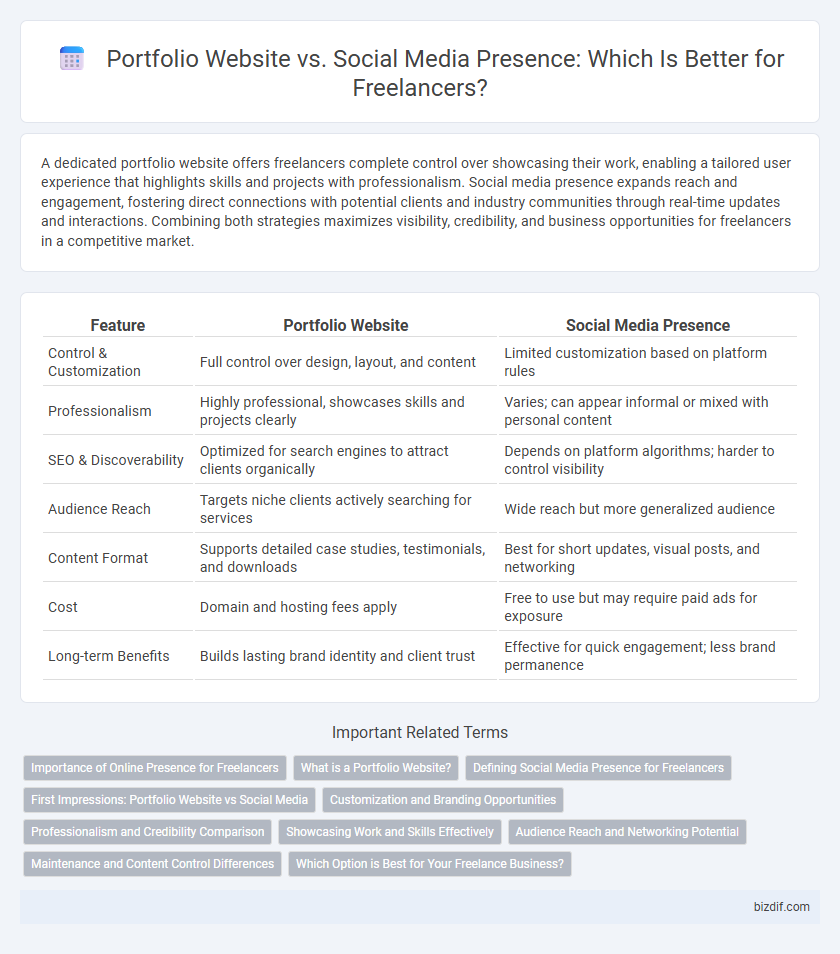A dedicated portfolio website offers freelancers complete control over showcasing their work, enabling a tailored user experience that highlights skills and projects with professionalism. Social media presence expands reach and engagement, fostering direct connections with potential clients and industry communities through real-time updates and interactions. Combining both strategies maximizes visibility, credibility, and business opportunities for freelancers in a competitive market.
Table of Comparison
| Feature | Portfolio Website | Social Media Presence |
|---|---|---|
| Control & Customization | Full control over design, layout, and content | Limited customization based on platform rules |
| Professionalism | Highly professional, showcases skills and projects clearly | Varies; can appear informal or mixed with personal content |
| SEO & Discoverability | Optimized for search engines to attract clients organically | Depends on platform algorithms; harder to control visibility |
| Audience Reach | Targets niche clients actively searching for services | Wide reach but more generalized audience |
| Content Format | Supports detailed case studies, testimonials, and downloads | Best for short updates, visual posts, and networking |
| Cost | Domain and hosting fees apply | Free to use but may require paid ads for exposure |
| Long-term Benefits | Builds lasting brand identity and client trust | Effective for quick engagement; less brand permanence |
Importance of Online Presence for Freelancers
A strong online presence is crucial for freelancers to attract clients and showcase expertise effectively. A portfolio website offers a professional, customizable platform to display projects, case studies, and client testimonials, while social media presence enhances visibility and networking opportunities. Combining both strategies maximizes reach, credibility, and client trust in competitive freelancing markets.
What is a Portfolio Website?
A portfolio website is a personalized online platform showcasing a freelancer's best work, skills, and testimonials, designed to attract potential clients through a professional and organized presentation. Unlike social media profiles, portfolio websites offer full control over content, design, and branding, enhancing credibility and providing a centralized space for detailed project descriptions and case studies. This focused format improves search engine visibility and serves as a powerful tool for converting visitors into clients by demonstrating expertise and unique value propositions.
Defining Social Media Presence for Freelancers
Social media presence for freelancers involves actively engaging on platforms like LinkedIn, Instagram, and Twitter to showcase skills, share projects, and connect with potential clients, which enhances visibility beyond a static portfolio website. It fosters real-time interaction, personal branding, and the opportunity to build a professional network, making it a dynamic complement to a portfolio site that primarily displays work samples. Effective social media presence leverages content marketing, testimonials, and industry trends to attract and retain client interest.
First Impressions: Portfolio Website vs Social Media
A portfolio website offers a tailored first impression by showcasing curated projects, professional branding, and detailed skillsets in a controlled environment. Social media presence provides dynamic visibility through frequent updates, audience engagement, and social proof but may lack the focused professionalism of a dedicated portfolio. Effective freelancers balance a compelling portfolio website with strategic social media activity to maximize credibility and client trust.
Customization and Branding Opportunities
A portfolio website offers unparalleled customization and branding opportunities, allowing freelancers to create a unique online identity that fully reflects their skills and style. Unlike social media platforms with standardized layouts and limited control, personal websites enable tailored design, domain ownership, and integrated multimedia showcasing work samples, enhancing professional credibility. This level of customization strengthens personal branding and attracts targeted clients by demonstrating professionalism beyond generic social media profiles.
Professionalism and Credibility Comparison
A dedicated portfolio website enhances professionalism by offering a customizable platform to showcase skills, projects, and client testimonials, establishing stronger credibility with potential clients. Unlike social media profiles, which often blend personal and professional content, a portfolio site ensures focused branding and seamless user experience designed specifically for freelance services. Search engines favor well-structured portfolio websites, improving online visibility and reinforcing trustworthiness in competitive freelancing markets.
Showcasing Work and Skills Effectively
A portfolio website offers a dedicated platform to showcase work and skills with full customization, ensuring a professional and cohesive presentation tailored to potential clients. Social media presence provides broad reach and networking opportunities but often limits control over layout and can dilute the focus with diverse content. Prioritizing a portfolio website enhances credibility and allows detailed case studies, while social media supports engagement and visibility within relevant industry communities.
Audience Reach and Networking Potential
Portfolio websites offer freelancers complete control over content presentation, enhancing professional credibility and attracting targeted clients through optimized SEO strategies. Social media presence enables rapid audience reach and dynamic networking by leveraging platform algorithms and real-time engagement with diverse user communities. Balancing a customized portfolio site with active social media profiles maximizes visibility and expands professional connections critical for sustainable freelancing success.
Maintenance and Content Control Differences
A portfolio website offers complete control over content, design, and updates, allowing freelancers to showcase their work precisely and maintain a consistent brand image. Social media platforms require frequent content updates to stay relevant, but they limit customization options and enforce platform-specific rules that can restrict content presentation. Managing a portfolio website involves periodic technical maintenance such as software updates and backups, whereas social media relies on regular engagement and algorithm-driven visibility to maintain audience reach.
Which Option is Best for Your Freelance Business?
A portfolio website offers full control over your brand presentation and showcases your best work with tailored design and detailed project descriptions, making it ideal for attracting serious clients and demonstrating professionalism. Social media presence enables rapid audience engagement, networking, and real-time updates but may lack the depth and customization of a dedicated portfolio site. For sustainable freelance business growth, combining a portfolio website with targeted social media strategies typically yields the best results.
Portfolio website vs Social media presence Infographic

 bizdif.com
bizdif.com